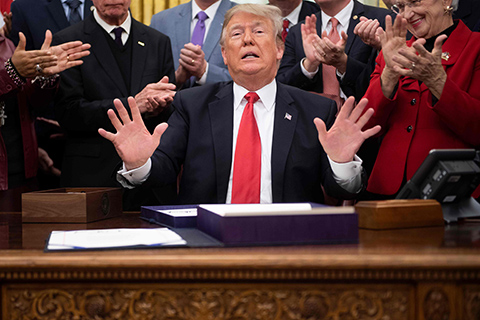

WASHINGTON: Anair of chaos enveloped Washington yesterday as the US government kicked off theholidays by partially shutting down, following the failure of leaders to pass afederal spending bill as negotiations stalled over Donald Trump's demand formoney to build a US-Mexico border wall. Operations for several key agenciesceased at 12:01 am yesterday (0501 GMT), despite last-ditch talks thatcontinued on Capitol Hill between White House officials and congressionalleaders in both parties.
Most criticalsecurity functions remain operational but 800,000 federal workers are impacted,with many furloughed just days before Christmas while others deemed essentialare working unpaid. And as many other Americans and tourists began vacationshead of end-of-the year holidays some national parks have shuttered completely,while others remain open but without any visitor services including restroomsand maintenance. New York's governor provided funding to the Statue of Libertymonument and Ellis Island so those key attractions could remain open.
The budgetwrangling and subsequent shutdown - the third in a year - cast a dark cloudover the US capital already reeling from Defense Secretary Jim Mattis' resignationannouncement Thursday. The uncertainty pushed Wall Street into a third straightrout on Friday, to end its worst week since late 2008 at the start of theglobal financial crisis. "President Trump threw a temper tantrum andconvinced House Republicans to push our nation into a destructive TrumpShutdown," Chuck Schumer, the top opposition Democrat in the Senate, andhis House counterpart, fellow Democrat Nancy Pelosi, said in a joint statement.
Trump has dug inon his demand for $5 billion for construction of a wall to curb illegalimmigration on the US border with Mexico. Democrats are staunchly opposed, andthe absence of an elusive deal means federal funds for dozens of agencieslapsed at midnight Friday. The House of Representatives and the Senate were dueback in session at noon yesterday. But it remains unclear how long the shutdownwill last, with Washington unable to accomplish one of its most basic tasks -keeping the government up and running.
"This is adereliction of duty by Congress and the president," said David Cox,national president of the American Federation of Government Employees. Trumpvoiced hope late Friday that it "will not last long" - after earliersaying he was ready for just that. His own Republican party still controls boththe House and Senate, but in January the House comes under Democratic control.
Governor RalphNortham of Virginia - a state bordering the US Capitol that is home to manyfederal workers - urged Trump in a letter Saturday to push immediate action toend the shutdown, saying it "inflicts real harm" on workers. "Ishare your desire for strong economic growth throughout the United States, butthe current partial government shutdown makes it harder to achieve thisgoal," the Democratic governor said.
Aboutthree-quarters of the government, including the military and the Department ofHealth and Human Services, is fully funded until the end of Sept 2019, leaving25 percent unfunded as of yesterday. Most NASA employees will be sent home, aswill Commerce Department workers and many at the Departments of HomelandSecurity, Justice, Agriculture and State. "It's up to the Democratswhether or not we have a shutdown tonight," Trump said earlier Friday,blaming his political opponents for the crisis. "I hope we don't,"the president added, but "we're totally prepared for a very longshutdown."
Should theyeventually strike a deal, it could swiftly clear Congress and reach thepresident's desk, said Senate Republican Bob Corker. One focus of discussionwas the $1.6 billion in border security funding that was a part of pendingSenate legislation, number two Senate Republican John Cornyn told AFP. Butconservatives in the House would likely balk at that figure. "There's noagreement," congressman Mark Meadows, chairman of the House Freedom Caucusof ultraconservatives, told reporters as he left a closed-door meeting on theCapitol's Senate side. "There's a whole lot of numbers being thrownaround," but a maximum $1.6 billion for border security "is notacceptable".
Trump reversedcourse Thursday and rejected a measure that had unanimously passed the Senateand was under House consideration. It would have extended government fundinguntil Feb 8, but contained no money for a border wall, a pet project Trump hasfought for since his presidential campaign. Democrats painted Trump as theGrinch who stole the year-end deal. With lawmakers like Meadows and prominentconservative commentators demanding that the president stick to his campaignpromises, Trump would not budge on his wall. The House swiftly passed a billthat fulfilled the president's demands. It included $5.7 billion in wallfunding, and $7.8 billion in disaster relief. But it stalled at the firsthurdle in the Senate. Trump was scheduled to fly to Florida Friday for hisChristmas break, but he postponed the trip. - AFP

